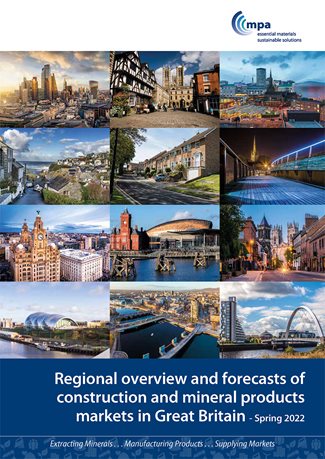 The Mineral Products Association (MPA) has published a new report which provides a thorough assessment of the historic, current and future trends in the construction and mineral products markets across every region of Great Britain.
The Mineral Products Association (MPA) has published a new report which provides a thorough assessment of the historic, current and future trends in the construction and mineral products markets across every region of Great Britain.
Primarily prepared to help inform and support the local mineral planning system, the 32-page report contains regional charts, data tables, and comparisons against the broader trends in the GB economy. As such, this comprehensive product also represents an essential tool for mineral operators across the country.
The report compares the 11 main regions across GB, illustrating the performance of construction subsectors over the past five years, the historical trend in sales volumes for mineral products, and the sectors that are expected to see the highest rates of growth in the 2022-25 period.
While the capital, London, is often regarded as the key hub of new construction projects and infrastructure (it currently leads GB with an 18% share of total construction activity), there is evidence of growth throughout GB, with the East Midlands, for example, proving a popular location for new industrial work.
MPA data included on mineral products sales volumes is collected through a rigorous survey process among prominent MPA members who make up a significant and representative portion of the overall mineral products markets. The quarterly sales data is collected four times a year and the MPA estimates that its survey represents 90% of total GB market sales for asphalt, for example, and 75% for ready-mixed concrete.
The report reveals that the East Midlands represents the biggest market for total sales volumes of asphalt and crushed rock, accounting for 14% and 28%, respectively. In fact, its asphalt volumes rose to their highest mark since 2007 last year. Meanwhile, the South West has seen a gradual increase in crushed rock sales volumes in recent years to their highest level on record.
London continues to dominate the sales volumes of ready-mixed concrete with a total share of 18%, while the South East and East of England make up almost 40% of sales volumes for sand & gravel. Upbeat forecasts for infrastructure and commercial work in these regions should underpin sales going forward, but typically, much could hinge on the progress of current projects and those in the pipeline against a more challenging economic backdrop. This is exacerbated by events in Ukraine which have fuelled rises in energy and raw materials prices, and disrupted global supply chains.
Luke George, Economic and Policy Analyst at the MPA said: “The objective of this new report is to shine a light on the contrasting dynamics of construction activity across the eleven regions of Great Britain in one easy-to-use document, offering valuable insight to MPA members and other industry experts. Construction is a core element in the government’s “Levelling Up” strategy and its success will depend on local mineral planning authorities and mineral producers having robust evidence around future market needs, given delivery is heavily reliant on the availability and supply of essential mineral products. Going forward, our intention is to update the information presented on an annual basis.”
The new report titled Regional overview and forecasts of construction and mineral products markets in Great Britain - Spring 2022 can be accessed on the MPA website.
Ends.
About the Mineral Products Association:
The Mineral Products Association (MPA) is the trade association for the aggregates, asphalt, cement, concrete, dimension stone, lime, mortar and silica sand industries. With the merger of British Precast, and affiliation of the British Association of Reinforcement (BAR), the British Calcium Carbonate Federation, the Cement Admixtures Assocation (CAA), CONSTRUCT, Eurobitume, MPA Northern Ireland, MPA Scotland and the UK Quality Ash Association (UKQAA), it has a growing membership of 520 companies and is the sectoral voice for mineral products. MPA membership is made up of the vast majority of independent SME quarrying companies throughout the UK, as well as the 9 major international and global companies. It covers 100% of UK cement and lime production, 90% of GB aggregates production, 95% of asphalt and over 70% of ready-mixed concrete and precast concrete production. In 2018, the industry supplied £16 billion worth of materials and services to the Economy. It is also the largest supplier to the construction industry, which had annual output valued at £172 billion in 2018. Industry production represents the largest materials flow in the UK economy and is also one of the largest manufacturing sectors.
For media enquiries, contact Elizabeth Clements at: Elizabeth.Clements@mineralproducts.org.